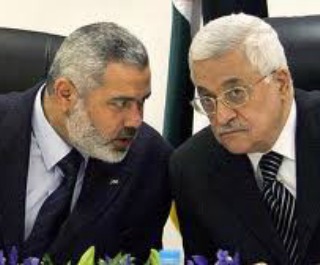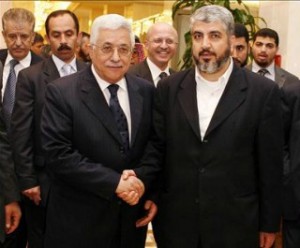On Monday, April 28, Professor Shibley Telhami of the University of Maryland and the Brookings Institute briefed APN on the consequences of the pause in the Israeli-Palestinian peace process.
On Monday, April 28, Professor Shibley Telhami of the University of Maryland and the Brookings Institute briefed APN on the consequences of the pause in the Israeli-Palestinian peace process.
This week, Alpher offers an assessment of where the American-brokered Israeli-Palestinian peace process stands now, with the nine-month period allotted for the process expiring officially this Tuesday and what next; what happens if there is Palestinian success at forming a unity government; or if there is not; What sort of unilateral move might Israel now invoke; will there be another American initiative; and what kind of unexpected possibilities should we expect?
 Washington, DC - Commenting on the status of ongoing Israeli-Palestinian peace efforts,
Americans for Peace Now's President and CEO Debra DeLee issued the following statement:
Washington, DC - Commenting on the status of ongoing Israeli-Palestinian peace efforts,
Americans for Peace Now's President and CEO Debra DeLee issued the following statement:
"APN's position is clear: Negotiations are the only route to resolving the Israeli-Palestinian conflict, and the only resolution to this conflict will be a mutually agreed-on two-state solution. However, the past nine months of peace efforts, led with admirable commitment and energy by Secretary of State John Kerry and his team, have failed to bring the parties closer to a two-state outcome. The current state of this peace effort exposes three structural weaknesses in the current process: the manifest bad faith of the Netanyahu government; the profound weakness of the Palestinian leadership; and the absence of adequate rules-of-the-game - and consequences for breaking these rules - put in place by the Obama Administration as the steward of these efforts.

Washington, DC – The Palestinian Liberation Organization (PLO) and Hamas today ended a seven-year rift by
reaching a historic reconciliation agreement.
Americans for Peace Now welcomes the agreement. APN holds that unity between the Palestinian political factions and
between the West Bank and Gaza is vital for empowering the Palestinian leadership to more credibly conduct
negotiations with Israel and to more efficiently implement a future peace agreement.
APN’s President and CEO Debra DeLee said: “The new Palestinian agreement is good news, and should be regarded as
such by the Obama administration and by the government of Israel. A Palestinian interlocutor who credibly
represents all the Palestinians is much better positioned to make hard decisions around the negotiating table and
is much better positioned to deliver when the time comes to implement a peace agreement. This reconciliation
agreement can and should empower and legitimize Mahmoud Abbas as a leader of the Palestinian polity.”
“We urge President Obama and Israel's Prime Minister Benjamin Netanyahu to continue interacting with Palestinian
President Mahmoud Abbas, and to determine the future relations of the U.S. administration and the Israeli
government with any Palestinian government based on that government's positions and actions alone.”
The Minister of Defense has approved the creation of a new settlement inside the Palestinian city of Hebron, making
it the first settlement in the city since the 1980s.
The impact of the settlement is remarkable: a large building, 4000 square meters, that can hold more than 20
settler families (more than 120 people) and on a strategic and pivotal location: relatively distant from the other
settlements inside Hebron, and on the route that connects Hebron to Kiryat Arba settlement.
 Israeli peace activist Ron Pundak, a trail-blazer of Israeli-Palestinian peace negotiations, died
today in Tel Aviv after a battle with cancer. He was 59.
Israeli peace activist Ron Pundak, a trail-blazer of Israeli-Palestinian peace negotiations, died
today in Tel Aviv after a battle with cancer. He was 59.
Dr. Pundak, together with his friend and academic colleague Yair Hirschfeld, established the now well-known “secret channel” with the Palestinian Liberation Organization, which led to the signing of the Oslo Agreement in September 1993. Recently, he published a book that documents the pre-Oslo efforts, titled "Secret channel: Oslo – the full story."
 Growing up, Passover was my favorite holiday. I loved the Passover story about the Jews
being saved from the evil Pharaoh in Egypt. I loved the miracle of the parting of the sea and survival
crossing the desert (as a kid raised in the Arizona desert, I felt a special kinship with those early
Israelites). I loved the Seder — especially the part where we dipped our fingers in the wine as we
enumerated each plague. And I of course loved the food, particularly my mother’s matzo balls (sinkers, not
floaters) and the red horseradish that always made me sniffle and sneeze — and which, invariably, somebody
spilled on the tablecloth to leave a permanent beet juice stain.
Growing up, Passover was my favorite holiday. I loved the Passover story about the Jews
being saved from the evil Pharaoh in Egypt. I loved the miracle of the parting of the sea and survival
crossing the desert (as a kid raised in the Arizona desert, I felt a special kinship with those early
Israelites). I loved the Seder — especially the part where we dipped our fingers in the wine as we
enumerated each plague. And I of course loved the food, particularly my mother’s matzo balls (sinkers, not
floaters) and the red horseradish that always made me sniffle and sneeze — and which, invariably, somebody
spilled on the tablecloth to leave a permanent beet juice stain.

Israeli strategic affairs expert Yossi Alpher, the author of APN's Hard Questions, Tough Answers, was our guest on an April 8 briefing call, mainly focusing on the crisis in the US-led Israeli-Palestinian negotiations process.
This week, Alpher discusses the flurry of obstructive peace process-related events of the past week, what derailed the process, and what could save it; the broader international situation; more basic or strategic factors informing the crisis; how serious the immediate damage is and how all this affects Israeli politics.